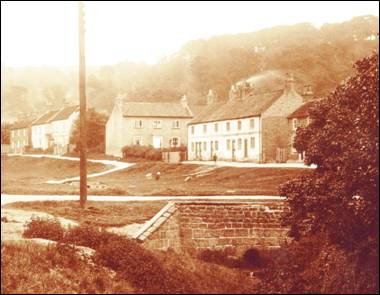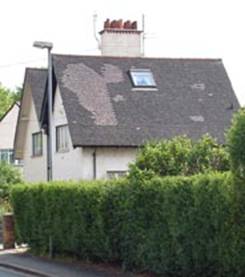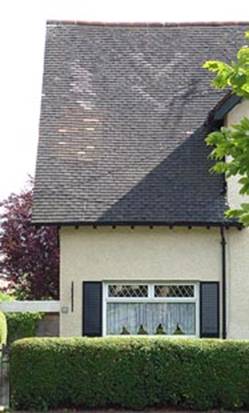
An Interview with 3 Evacuees from Hull
previous article | up | next article

No 55, where Billy and his family lived, is the second from the end of the white fronted block of five cottages above. They are no longer there.
Billy: I was just saying to Queenie [Billy’s wife] about furniture, when we rented that little cottage, I'm sure it was rented as furnished and all I can remember that it had in it was one small room that would be the general living room, with a black ordinary grate with an oven at the side of it that Mam used to use for baking, and then there was a little scullery at the back, it wouldn't have made a kitchenette, it was only about 4 feet across, and a larder at the end, that they called a dairy. There were beamed ceilings. I can't think that there was any other furniture apart from a table and chairs. I can't ever remember there being any easy chairs. You opened a door from the living room to go upstairs, and when you got upstairs there was a bedroom with a four-poster in, no drapes on it, just the 4 posts and very little other furniture. And in the bedroom where Arthur and I slept, it was so small it took a three-quarter bed, not a double, and we had to cross the bed to get into bed, there was no room at the side. There was a dressing table which was a tea chest turned upside down with a drape over the top with one of those free standing mirrors on the top. And that was our furniture. In Hull we only lived in a little cham-four house, so we weren't really brought up in absolute luxury, but we were furnished, we had a 3-piece suite in the living room and comfortable chairs. When we went to live with Mr and Mrs Beulah, their house was vast to what we were used to, my Dad shipped out our 3-piece suite and we put it in Mrs Beulah's front room, and our 3-piece suite stayed there until the end of the war. Mrs Beulah didn't have one, so they used it. But the cottage we went into was so ruddy small that you couldn't have got a 3-piece suite in it. Our lives changed completely just like that.
Kate: Did you have a bathroom in Hull?
All: No, no.
Dennis: We did have one when we came home to Hull, when we lived at 31, but we were only in there a few weeks, before we moved into 11, where I live now, and it had a bathroom.
Margaret: But before that we used to get bathed in front of the fire in a tin bath.
Billy: The majority of people did.
Dennis: At 31 there was gas lighting, but at 11 we had electric lighting.
Billy: We had electric lighting put in the cottage at 55 Bishop Wilton - they came to do it while we were there. All they put in was one centre light in the front room - nothing else, no plugs or anything. Before that we had aladdin lamps and paraffin lamps and candles to go to bed with.
Dennis: There was electric in ours, wasn't there Margaret? Upstairs and downstairs as far as I can remember. But no bathroom.
Mike: Did you think at the time that it was more primitive?
Billy: It was a bit of a culture shock at first, you just accepted it though. The old stock saying, if you cribbed about anything, all you got from anybody was "There's a war on you know", whether you were hungry, cold, wet, miserable, homesick, fed up - "There's a war on you know". In other words "Shut up".
Dennis: The only thing that I really resent is not knowing my Mum and Dad.
Billy: The one thing I resent, now this sounds awful does this, but I used to resent it something shocking - my Dad was called up into the Forces, and died at 32, yet I lived in a village where there were loads and loads of young men who weren't called up because they worked on the land. And I used to think, well my Dad could have worked on the land. At the same time, it was hitting city dwellers worse than anything; the families who were left in Hull were getting bombed out every day - there was 48 thousand houses damaged in Hull, you've no idea. You'd come back to the town, which we did occasionally, and you didn't recognise it.
Margaret: No, it was awful wasn't it, the devastation.
Billy: You know that gap in Mersey Street, we were walking down there and our Dolly told us to get into the shelter - "Get them lads in the Shelter" - we got in the shelter, so did Dolly, the bomb dropped, the warden was blasted down into the shelter, he was dead as a doorknob. We thought he was just asleep on the floor. The blast had hit him, and down he went, not a mark on him. But even at school it wasn't funny, was it? If there was a raid before 3 o'clock you didn't have to go to school before 10 in the morning.
Margaret: Bill, do you remember being bussed from Mersey Street School, because it was bombed?
Billy: Yes, we went to Cavendish Road.
Margaret: That's right - I couldn't remember which school we went to. That was before we were evacuated. We had tripe and onions for dinner!
Billy: I tell you what I do remember, there was an air raid on and it was day light at the beginning of the war, and you could see these aeroplanes going across, quite high up, and gunfire bursting round them. And a man came running down Dansom Lane and he was really panicking and he was saying, "There's parachutists, there's parachutists". So us kids were looking for them all over - but what he thought were parachutists was the shells bursting and puffing out like that. He really was panicking, because that time was a frightening time and people didn't know what to expect.
Mike: When did the bombing start in Hull?
Margaret: It must have been 1940; that's why we were evacuated, because I was frightened to death.
Billy: Where we lived it was such a tiny house with only a little backyard, so there were shared Anderson shelters - we didn't want to go in them because they used to smell. Opposite us there was a lady who lived who had an Anderson shelter, one of them round ones, and my Dad put all railway sleepers on the top and he covered it all with soil - that was the epitome of safety to us. Well, we got in this shelter one night and there was all hell let loose, we didn't know what was going on. All you knew was you heard the thump when a bomb dropped, just a thump - and we could hear all this thump, thump, thump, and we didn’t know what was going on. The all clear goes, and we get out of the shelter and the top of the shelter was swept absolutely clean, the sleepers had gone, all the soil had gone, just as though somebody had got a big brush and gone whooosh. Across the road at our house, we had no windows, no roof, no nothing. But the house was stood all right, we lived in it afterwards. They re-roofed it with asbestos roofing. And I think the asbestos roof is still on.
Dennis: In our street incendiary bombs had fallen on all the houses. They were running down the spouts and all the gutters were on fire.
Billy: When it got bombed properly, the most cruel thing was that people looted the stuff out of your house.
Margaret: Isn't that terrible - how could they do that? I can't understand such wickedness.
Billy: They even took the carpet up out of the front room. I remember the soldiers repaired the roofs, a lot in Garden Village, and you can still see 3 dots and a dash, V for Victory on the roofs.
Margaret: If you go into Garden Village you can see all the roofs - they're all tiled and you can see all the different tiles, and that's where the incendiary bombs fell.


General roof damage in Garden Village and a V for Victory design
Billy: The soldiers got hold of a character who had been looting and they literally kicked him all the way up Dansom Lane to the Central Police Station where they handed him over - there was a very severe punishment for it, you could get 10 years you know.
Margaret: They deserved it though, didn't they?
Billy: I think they should have been shot.
Margaret: Times haven’t changed have they? They say the good old days, but it was no different was it?
Page 10 of 11
(c) Copyright 2009 Contributors. All rights reserved. |